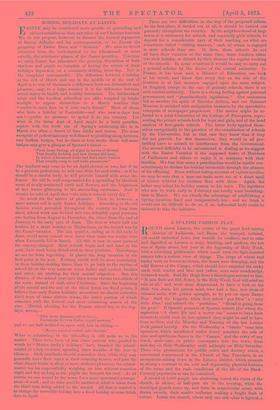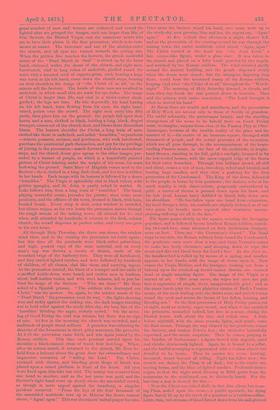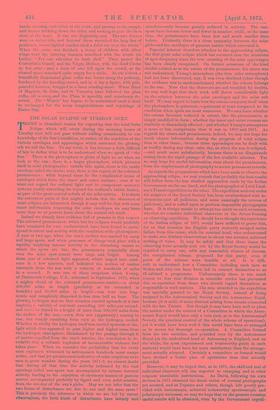A SPANISH PASSION PLAY.
ROUND about Linares, the centre of the great lead-mining district of Andalusia, and Baeza, the tranquil, isolated, old-world cathedral town just outside its confines, and as calm and dignified as Linares is busy, bustling, and modern, the hot sun of Spain shone, last year at the beginning of Holy Week, with a scorching pitilessness which made even the light-hearted miners take a serious view of things. The crops of wheat and barley were as brown as sienna, the beans were drooping, and the wild flowers of the Campo, which should have carpeted the rocky earth with scarlet and blue and yellow, were mere nondescript, withered weeds. Said Mr. Hugh Rose's Manchegan servant to him, " If rain does not fall, Senor, in the Holy Week, God will send no rain at all," and went away despondent, to have a look at his little San Juan, his patron saint, who had a fine, new dress of crimson satin, with golden spangles, to be put on upon Easter Day. Said the beggars, when they asked "por Dios " a " very little alms," and saluted the "purissima," "Bread is going from the poor." If Spanish peasants or Spanish miners (for whom the aspiration "A short life and a merry one" seems to have been invented) could ever be low-spirited, they might be said to have been so then, and the Monday and Tuesday of the last Lenten week passed heavily. On the Wednesday a "bando " came into operation, which interdicted under heavy penalties the sale of wine and spirituous liquor in the " Campo," and the entry of any coach, mule-cart, or public conveyance into the town, from mid-day on Holy Wednesday until midnight on Holy Saturday. These wise precautions for public order and decency taken, a ceremonial commenced at the Church of San Francisco, in an anonymous mining town in the Linares district, which presents as strong a contrast to the arid and depressing physical features of the scene and the rude conditions of the life of the Black- Country population as can be conceived.
A crowd of 2,000 people are clustering round the doors of the church, in silence, at half-past six in the evening, when the municipal guards come up, and form in semicircular array, with drawn swords, their scarlet uniforms making a bright flash of colour. Inside the church, where only one side-altar is lighted, a
great number of men and women are collected, and round the lighted altar are grouped the images, each one larger than life, of Our Saviour, the Blessed Virgin, and the numerous saints who are to have their places in the first procession, which is to com- mence at sunset. The Governor and one of the alcaldes enter the church, and all eyes are turned towards the setting sun. When the golden line touches the horizon, the grand, mournful .music of the "Dead March in 'Saul' is struck up by the brass band, stationed within the doors of the church, and eight men, barefooted, clad in long robes of sackcloth, girdled round the waist with a knotted cord of esparto-grass, each bearing a huge wax torch in his left hand, come down the church steps, bearing All their shoulders the image of "the Christ of us all," as the miners call the Saviour. The heads of these men are swathed in sackcloth, in which small slits are made for eye-holes. The image of Christ is larger than life, and clad in a violet-velvet cloak, _girdled ; the legs are bare. He sits dejectedly, his head leaning on his left hand, tears flowing from his eyes, his right hand, raised, points over the crowd. The eight men carry him fifty _yards, then place him on the ground ; the people fall upon their knees, and a man, clothed in black, holding a long, black, draped trumpet, comes out of the church door, and blows three discordant lasts. The bearers shoulder the Christ, a long train of men, clothed like those in sackcloth, and called "humildes," or penitents —miners, peasants, artisans, and gentlemen, who walk barefooted, purchase the penitential garb themselves, and pay for the privilege of joining in the procession—march forward with slow and solemn .steps, and the church doors give egress to the other images, pre- ceded by a banner of purple, on which is a beautifully painted picture of Christ fainting under the weight of his cross, his tears bedewing the ground. Saint Mary of Magdala comes next to the ,Saviour ; she is clothed in a long, drab cloak, and her face is hidden in her hands. Each image with its bearers is followed by a dozen Ithumildes." The Virgin is splendidly clad in black velvet, with golden spangles, and St. John is partly robed in scarlet. St. Luke follows him, then a long train of "humildes." The baud, playing mournful music, precedes the priests ; then come more penitents, and the officers of the town, dressed in black, with bare, "'ended heads. Every shop is shut, every window is crowded, but silence reigns, as for two hours the procession moves through the rough streets of the mining town, all cleared for it ; and when, still attended by hundreds, it returns to the dark, solemn church, the crowd disperses in perfect order, and every one goes to his own home.
All through Holy Thursday, the fierce sun shone, the rainless wind blew, and in the evening the procession set forth again ; but this time all the penitents wore black-calico gabardines, and high, peaked caps of the same material, and on every man's cap was thrown a crown of thorns, made of the wreathed twigs of the barberry-tree. They were all barefooted, and they carried lighted torches, and were followed by hundreds of children, of all classes, clad like them, and carrying tapers. As the procession started, the blare of a trumpet and the rattle of .a muffled kettle-drum were heard, and twelve men in buskins, short, buff-leather tunics, and with steel helmets, fell in just be-
-kind the image of the Saviour. " Who are those ?" Mr. Rose asked of a Spanish pitman. "The soldiers who destroyed our 'Christ," was the answer. So, again, to the solemn music of the " Dead March" the procession went its way, " the lights showing -wan and sickly against the sinking sun, the dark images standing
out in bold relief against the steely-blue sky, the long line of the humildes' dividing the eager, orderly crowd." On the morn- ing of Good Friday the cold was intense, but there was no sign -of rain. At five in the morning the church was crowded, and a multitude of people stood without. A preacher was enforcing the doctrine of the Atonement in short, pithy sentences, like proverbs.
At 6.30 the procession came forth, and was again joined by the Roman soldiers. This time each penitent carried upon his shoulder a black-stained cross of wood, four feet long. When, .after its solemn march, it returned to the church, Mr. Rose be- held from a balcony above the great door the extraordinary and impressive ceremony of " selling the Lord." The Christ, .crowned with thorns, and bleeding great drops of blood, was placed upon a raised platform in front of the doors. All eyes were fixed upon him who was sold. The money was counted from one hand to another, and as the last piece was paid, and the
'Saviour's right hand went up slowly above the assembled crowd, as though in mute appeal against the treachery, a singular
incident occurred. " From the lips of the four thousand of the assembled multitude rose up to Heaven the fierce, earnest shout, " Avis! agua !" This was the miners' united prayer for rain. Once more the Saviour raised his hand, once more went up to the steely sky, now growing blue and hot, the urgent cry, " Ag-ua!
agua !" At five o'clock that afternoon a slight shower fell, and as the procession of the evening wound its way through the mining town, the entire multitude cried aloud, "Agua, agna !" The Christ carried at the head was "the dead Lord," a fair, corpse-like figure, under a glass case. It was taken to the church and placed on a lofty tomb, guarded by two angels, and watched by the Roman soldiers. The wind whistled shrilly around the ancient building, and the people dispersed slowly when the doors were closed ; but the strangers, lingering long there, could hear the measured tramp of the Rowan soldiers, keeping vigil over "the Christ of us all " throughout the "Watch- night." The morning of Holy Saturday dawned, in clouds, and soon after day-break the rain poured down in torrents. Then said the miners, with entire conviction, " The Lord brought it when he moved his band."
At Baeza there are wealth and stateliness, and the processions of Holy Week are second only to those of Seville in grandeur. The awful solemnity, the picturesque beauty, and the startling strangeness of the scene to be beheld there on Good Friday must, we imagine, surpass those even of the Passion Play at Ober- Ammergau, because of the terrible reality of the place and the manner of it,—the centre of an immense square, thronged with thousands of people, and the actual processes of the execution, which are all gone through, to the accompaniment of the heart- rending Passion music, in the face of the multitude, in bright- hued dresses, standing in the full, golden sunlight, hemmed in by the low-roofed houses, with the snow-capped ridge of the Sierra for their outer boundary. Through this brilliant crowd, all still and silent, comes a row of men, two-deep, robed and hooded, and bearing large candles, and they clear a pathway for the first procession of the Condemned. The King of the Jews, delivered to the people, is borne by four penitents ; the derisive robe of his mock royalty is rich claret-colour, gorgeously embroidered in gold; a crown of thorns is pressed down upon his brow, and his hair (real, human hair) dabbled in blood, falls down over his shoulders. "He has fallen upon one hand from exhaustion, his head droops a little, his nostrils are slightly widened, as of one who pants for breath ; mute reproof, utter weariness, uncom- plaining suffering are all in the face."
The figure passes slowly up the square, severing the thronging populace, and is followed by one hundred Roman soldiers, march- ing two-and-two, some mounted on fiery Andalusian chargers, some on foot. These are "the Centurion's Guard." The band steps to one side, the Roman soldiery form round the Condemned, the penitents once more clear a way, and Saint Veronica comes to make her lowly obeisance, and stooping down, to wipe the sweat and dirt and blood from the Lord's face. As she does so, the handkerchief is rolled up by means of a spring, and another appears in her hands, with the image of Jesus upon it. Now comes the Virgin Mother, and the foreigner, looking out from a balcony upon the crushed-up crowd cannot discern one covered head or single standing figure. The image of the Virgin is a marvel of art. " Her arms move, she wipes her eyes, her pale face is expressive of simple, sheer, unapproachable grief ; and as the many bands play the most plaintive strains of Bach's Passion music, at the most wailing note she draws near, and puts her arms round the neck and across the breast of her fallen, fainting, and bleeding son." So the first procession of Holy Friday passes out of sight, amid an orderly, eager crowd, and when it has vanished the prisoners, manacled indeed, but free in a sense, during 'the blessed hours, walk about the city, and solicit alms. A little before nightfall, with the same crowds, lights, and music, come the final scenes. Through the way cleared by the penitents comes
the Saviour, and washes Peter's feet ; the attitudes beautifully expressed, and the music exquisite. Then he comes, praying in
the Garden of Gethsemane ; a figure bowed with anguish, amid real shrubs, dexterously lighted. Again he is bound to a pillar, and the fearful scourging is represented with a realism almost too dreadful to be borne. Then he carries his cross, fainting, lacerated, weary beyond all telling. Night has fallen now ; the crowds are denser, the Plaza is all dark ; but in the centre are moving forms, and the blaze of lighted candles. Profound silence reigns, so that the night-wind, blowing in fitful gusts from the mountains to the southward, can be distinctly heard. For the last time a way is cleared, for this :— " Now the Christ was raised aloft, in that dim, silent, but teem- ing Plaza, nailed upon the cross,—a public spectacle, his dying figure barely lit up by the torch of a penitent or a ruthless soldier. Little, thin, red streams of blood flowed down from his nail-pierced
hands, crossing each other at the wrist, and passing to the armpit, and thence trickling down the sides, and soaking in gore the linen cloth at the waist. It was too frightfully real. The two thieves were on either side, and beyond them stretched the long line of penitents, whose lighted candles shed a fitful ray over the whole." When the scene was finished, a troop of children with silver wings went by, carrying banners inscribed with the words (in Latin), " For our salvation he bath died." Then passed the Centurion's Guard, and the Virgin Mother, with the dead Christ in her arms ; and a hush of awe fell upon the crowd, as the cleared space remained quite empty for a while. At ten o'clock a beautifully illuminated glass coffin was borne along the pathway, bordered by the kneeling crowd, and in it lay a figure, with pale, peaceful features, wrapped in a linen winding-sheet. When Mary of Magdala, St. John, and St. Veronica have followed the glass coffin, all is over,.and the Plaza is speedily and noiselessly de- serted. The "Watch" has begun, to be maintained until it shall be exchanged for the noisy congratulations and rejoicings of Easter Day.




































 Previous page
Previous page